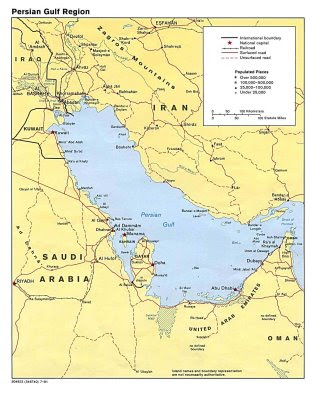Obviously satire, but let’s take a look at what is driving it.
It’s simple – President Biden’s ill-advised and ill-timed policies on
Since taking office on January 20, Biden has signaled to
both the Iranians and our allies alike that he will be attempting to engage the
Iranians, despite the consistent Iranian repudiation of Obama’s efforts to do
the same during his eight years in office. In the past few days, Secretary of
State Tony Blinken, a former Obama official, has stated, “The path to diplomacy
is open right now” with
Let’s follow that thought – just who will be advising Biden
on his
Blinken previously served in the Obama Administration as Deputy
National Security Advisor from 2013 to 2015 and Deputy Secretary of State from
2015 to 2017. Before that, from 2009 to 2013, he was the National Security
Advisor to Vice President Biden. His focus was, among other things,
Then we have National Security Advisor Jake Sullivan. Sullivan
worked in the Obama Administration as Director of Policy Planning at the Department
of State, and as Deputy Chief of Staff to Secretary of State Hillary Clinton,
then as National Security Advisor to Vice President Biden from 2013 to 2014. He
was also a senior advisor for the
Rounding out the
Biden has tasked Malley to bring both the
It could be worse. If John Kerry had not been named as the
jet-setting Special Envoy on Climate Change, he would likely be advising Biden
on
Former Director of the Central Intelligence Agency and
Secretary of Defense Robert Gates said of Biden, “He has been wrong on nearly
every major foreign policy and national security issue over the past four
decades.” With these three – Blinken, Sullivan, and Malley – advising Biden on
In addition to this Obama-rerun cast of advisors, let’s look
at some of the actions of the new administration in “containing”
Some of the first actions Biden has taken in the region was
to freeze the sale of F-35 stealth fighter jets to the
After almost a month in office, Biden has yet to call
Prime Minister Benjamin Netanyahu – you’d think that a call to
Biden has also frozen impending sales of advanced munitions
to
In an even more incredulous, and in my opinion, utterly
moronic, move, Biden has removed the Huthi movement – a Shi’a militant group
supported, trained, and armed by
It is ironic – right out of the gate, Biden has protected a
terrorist group supported by the world’s leading state supporter of terrorism,
and taken punitive measures against the two countries leading the fight in
support of the Yemeni government which the
Here’s what to watch in the near future. On February 15, a
group believed to be associated with Iranian-supported Iraqi Shi’a militias
claimed responsibility for an attack on a
What will Biden do in response? If he does nothing, he will be perceived as weak. If that is the case, he will have failed the test – get ready for increased Iranian-sponsored militia attacks on US and allied coalition facilities and personnel.
With the Obama Administration holdovers, the team that brought
us the dangerous and disastrous JCPOA, we have some insight as to where Biden’s
policy toward
It is not a good place.







 In his words: "I think it's a cost-benefit analysis - I think despite the large amount of trade we [UAE] do with Iran, which is close to $12 billion … there will be consequences, there will be a backlash and there will be problems with people protesting and rioting and very unhappy that there is an outside force attacking a Muslim country; that is going to happen no matter what."
In his words: "I think it's a cost-benefit analysis - I think despite the large amount of trade we [UAE] do with Iran, which is close to $12 billion … there will be consequences, there will be a backlash and there will be problems with people protesting and rioting and very unhappy that there is an outside force attacking a Muslim country; that is going to happen no matter what."



.jpg)
